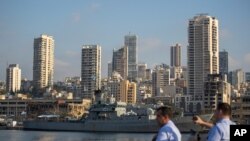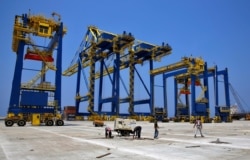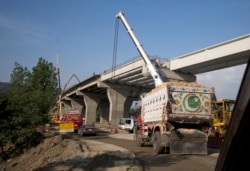Lebanon’s port of Beirut, severely damaged in the recent devastating explosion, has resumed partial operations, according to authorities.
Kuwait has offered to help Lebanon reconstruct and operate the facility as well as others in the cash-strapped nation.
Analysts said China is also eyeing its prospects to rebuild the port as yet another entry way to spread its influence into the eastern Mediterranean. The overtures to Beijing are raising concerns.
Journalist Baria Alamuddin, writing in Saudi newspaper Arab News, has expressed alarm that Iran-backed Hezbollah courted China. She said, “Chinese companies have long sought to play a major role in Lebanese infrastructure projects proposing $12 billion worth of investments in ports, railways, electricity and waste management.” But as Alamuddin points out, “Infrastructure projects reliant on Chinese engineers and labor would hardly help reduce Lebanon’s 35% unemployment rate.”
China’s Xinhua news agency reports a Chinese engineering company has been working to rehabilitate one of Lebanon’s other ports, Tripoli, creating a berth to accommodate Chinese cranes capable of moving about 700 containers per day.
Professor Habib Malik of the Lebanese American University told VOA that the majority of Lebanese don’t want to leave the West or Arab spheres of influence for those of Hezbollah and China.
“If this continues, a Chinese port or two in both Tripoli and Beirut will be coming to a coastline near you, in the Mediterranean," Malik said. "The Chinese set up debt traps for countries and this gets them to fall completely into China’s lap. Is this what the U.S and the West want for Lebanon, the Levant and eastern Mediterranean?”
Since 2013, China has embarked on an ambitious, expansive infrastructure project known as the Belt and Road initiative, which involves investing in several nations. Some critics said it leaves host countries with massive amounts of debt. China said no political strings are attached to its investments and loans.
The Middle East Institute’s president, Paul Salem, said there are major concerns about China potentially rebuilding Beirut’s port. He said it would present a huge geopolitical, long-term issue since a country doesn’t just build ports for a year or two.
“China, obviously, is the main builder of ports. It is ready to do so and extend its influence in the Mediterranean," Salem said. "It already has a presence to manage Haifa port in Israel, which has been a huge concern for the United States. It also has a deal with Athens over Piraeus port. If it were to rebuild Beirut port in the next five to 10 years, that would mean for the 21st century, China dominates in terms of trade and also the eastern Mediterranean.”
Salem, however, said he does not think that Beirut port will be rebuilt in a major way. Hezbollah, he said, “doesn’t want to relinquish the port” and so may possibly have it “patched up.” He said it is likely that neither China nor any other country would want to “invest $5 billion in the port, if Hezbollah would continue to keep it at risk.” But Salem said he hopes the international community will continue to press Lebanese politicians for badly needed political reform.






